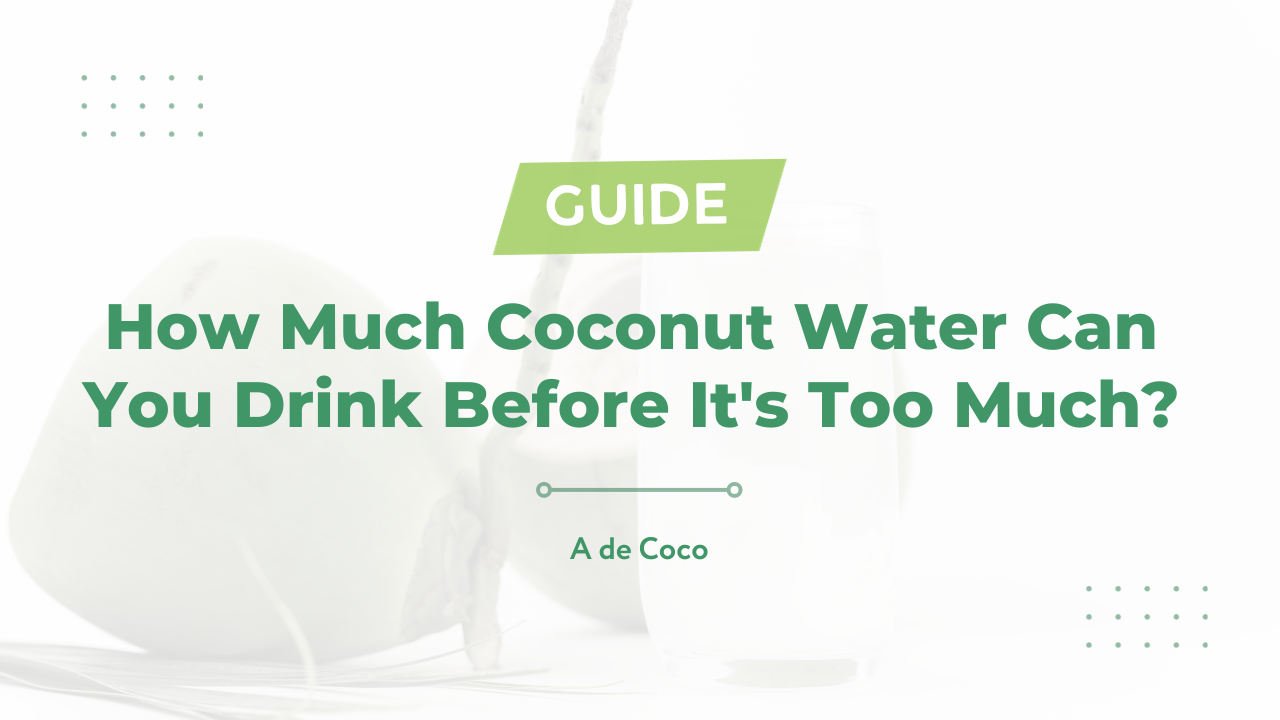Coconut water has seen a significant surge in popularity in recent years, often touted for its numerous health benefits.
This naturally sweet beverage, packed with nutrients, is not just refreshing but also boasts incredible hydrating properties.
Among fitness enthusiasts and those seeking a healthier lifestyle, it’s the beverage of choice.
However, as beneficial as it may be, one might wonder about its consumption limits.
Ingesting any food or drink in excess, regardless of its benefits, often leads to unwanted side effects.
Today, we delve into understanding the possible repercussions of consuming excessive coconut water.
Contents
- How Much Coconut Water Can You Drink Before It’s Too Much?
- Understanding the Nutritional Profile of Coconut Water
- Key Benefits of Drinking Coconut Water Regularly
- How Much Coconut Water is Too Much?
- Effect of Overconsumption on Calorie and Sugar Intake
- Potential Risks of Excessive Potassium Consumption from Coconut Water
- How Excessive Amounts of Coconut Water Can Impact Kidney Function?
- Who Should Be Particularly Cautious with Coconut Water Consumption?
- Steps to Include Coconut Water in Your Diet Sensibly
- How Does Physical Activity Level Influence Coconut Water Intake?
- Final Thoughts
How Much Coconut Water Can You Drink Before It’s Too Much?
The appropriate amount of coconut water consumption can depend on individual factors such as body weight and physical activity level. However, health professionals typically recommend not exceeding 2-3 cups (16-24 ounces) a day to prevent high calorie and sugar intake. Overconsumption can lead to an excess in potassium which could affect kidney function.
Delving deeper into the subject of coconut water consumption, it is crucial to discuss the potential implications on health.
This comprehensive review will examine the advantages and disadvantages of this tropical beverage, extending beyond the general recommended intake.
The focus will include the nutritional content, hydration qualities, and how these elements can affect individuals differently based on their health needs and lifestyle.
By exploring these intricacies, you can be informed about whether coconut water is beneficial for you and how to incorporate it into your diet effectively.
Understanding the Nutritional Profile of Coconut Water
Coconut water has been hailed as a miracle drink by many, due to its numerous health benefits and delightful taste.
Whether consumed casually or used as a sports drink substitute, it’s important to understand its nutritional profile.
This tropical beverage is natural, fat-free, and low in calories.
Nutritional Composition of Coconut Water
Coconut water contains a variety of vitamins and minerals, making it a powerhouse of nutrition.
It is rich in essential minerals like potassium, magnesium, and calcium.
It’s a well-known source of vitamin C, while also providing modest amounts of vitamins like B1, B2, B3, B5, and B6.
Additionally, it has a significant amount of dietary fiber, protein, and antioxidants.
Antioxidants in coconut water help neutralize harmful free radicals in the body and protect against oxidative stress and inflammation.
It is rich in essential minerals like potassium, magnesium, and calcium.
As outlined in the quote above, these minerals are vital for various bodily functions.
Potassium regulates heartbeat and muscle function, magnesium is necessary for immune functioning and bone health plus calcium is crucial for bone and tooth health.
Combined, this mineral-rich composition of coconut water can contribute positively towards overall wellness.
Sugar Content in Coconut Water
It’s essential to note that while coconut water is a healthier choice compared to most sugary drinks, it does contain natural sugars.
Per 100 ml serving, coconut water contains approximately 2.61 grams of sugar.
Although it’s a small amount, frequent consumption can lead to an increased intake of sugars, especially if combined with other sugar-laden foods or beverages.
Consequently, individuals watching their sugary food intake should also monitor their coconut water consumption.
This moderate sugar content contributes to its sweet, nutty taste but doesn’t elevate it to the unhealthy category like most artificial sweet drinks.
Per 100 ml serving, coconut water contains approximately 2.61 grams of sugar.
This relatively small amount of sugar contributes to the sweet, refreshing taste of coconut water but should be considered within the context of an individual’s overall diet.
Given its nutritional profile, coconut water can be a fantastic addition to a balanced diet when consumed in moderation.
Its natural sugar content is significantly less than that of artificial drinks, making it a healthier hydrating choice.
Hydration Power of Coconut Water
One of the primary benefits of coconut water is its hydrating ability.
With a high electrolyte content, specifically potassium, it helps restore the body’s fluids, making it an excellent choice for hydration.
This high hydration capacity makes it particularly popular among athletes and those engaged in strenuous activities.
However, it’s also beneficial for people experiencing dehydration due to ailments, hot weather, or just everyday water needs.
Besides hydration, the potassium in coconut water can help maintain optimal blood pressure levels and health in general.
Key Benefits of Drinking Coconut Water Regularly
Coconut water has gained significant popularity in recent years, due to its abundant health benefits.
Often dubbed as the ‘nature’s sports drink’, coconut water is a great source of several essential nutrients and offers immense health benefits if consumed regularly.
This natural beverage is low in calories, almost fat-free and has a significantly lower sugar content compared to other fruit juices and soft drinks.
Due to these properties, it can be a good choice for those trying to maintain a healthy weight or even lose weight.
Hydration and Electrolyte Balance
The rich electrolyte content of coconut water boosts its hydrating capabilities significantly.
It is especially beneficial in rehydrating the body after an intense bout of physical activity or during harsh, hot weather when the risk of dehydration is remarkably high.
Electrolytes in coconut water, such as potassium and sodium, help balance the fluid levels in the body and facilitate muscle function.
They replenish the body’s lost electrolytes due to sweating and create an optimal environment for the body to perform necessary physical functions.
The rich electrolyte content of coconut water boosts its hydrating capabilities significantly.
This remarkable hydrating property of coconut water can be extremely beneficial for athletes or people who workout regularly.
Not only does it help replace the fluids lost through perspiration, but it also aids in muscle recovery post-workout.
Heart Health and Blood Pressure Control
Coconut water also offers considerable benefits when it comes to maintaining heart health and controlling blood pressure levels.
It contains an ample amount of potassium, which is known for its blood pressure-lowering effect.
Regular intake of potassium-rich food or drinks can help maintain optimal blood pressure levels, reducing the risk of heart diseases and strokes.
Moreover, some studies have shown that consuming coconut water regularly may help lower the levels of bad cholesterol in the body, further promoting heart health.
However, more research is needed in this area to confirm these effects.
Coconut water contains ample potassium, known for its blood pressure lowering effect.
The potential of coconut water to lower cholesterol levels can be a game-changer for individuals suffering from high cholesterol.
Coupled with other healthy lifestyle adaptations, the regular consumption of coconut water may play a significant role in promoting overall heart health.
Other Notable Benefits
Other than the prominent hydration and heart health benefits, coconut water has various other potential health benefits as well.
These include aiding digestion, boosting skin health, and acting as a diuretic.
Rich in fiber, coconut water can aid digestive health by promoting regular bowel movements.
The presence of plant compounds and antioxidants may have beneficial effects on the skin, reducing acne and other skin problems.
Being a diuretic, it can also help to detoxify the body, promoting kidney health.
Rich in fiber, coconut water can aid digestive health by promoting regular bowel movements.
While these potential benefits do exist, it’s important to note that more extensive research is needed to assert these claims fully.
However, the existing claims coupled with the nutritional profile of coconut water do make it a valuable addition to a regular diet.
How Much Coconut Water is Too Much?
Given the varied benefits that coconut water offers, one might wonder, how much is too much?
In moderation, coconut water can be a refreshing beverage with several health benefits.
However, excessive consumption can lead to adverse effects.
Finding a Healthy Balance
As with many aspects of diet and nutrition, balance and moderation are key.
While there isn’t a defined limit on how much coconut water a person can safely consume, it is recommended not to make it your main source of hydration.
Water remains the healthiest, most natural way to hydrate.
Coconut water is best used as an occasional replacement for processed, sugary beverages, or to switch up your hydration routine.
Finding the right balance in your coconut water intake can largely depend on one’s personal health, physical activity levels, and overall nutritional requirements.
Many factors determine how much coconut water a person can safely consume.
People with kidney conditions or those on blood pressure medications need to be especially cautious.
Staying Hydrated
One of the main benefits of consuming coconut water is staying hydrated.
However, overconsumption can cause imbalances in your body’s electrolyte levels, leading to conditions like hyperkalemia, or excess potassium in the blood.
Typically, for healthy adults, a serving size of one to two cups per day is considered safe and beneficial.
Remember, it’s important to balance this against your full dietary intake and activity levels throughout the day.
Lastly, bear in mind that every individual is unique, and thereby, nutritional needs can vary widely.
It is always advisable to consult with a healthcare professional before significantly altering your diet or hydration routine.
Effect of Overconsumption on Calorie and Sugar Intake
Caloric Content of Coconut Water and Its Impact
The average caloric content of coconut water hovers around 60 calories per 330ml, which is significantly lower than most other beverages.
Nonetheless, while coconut water’s caloric content may seem negligible, overconsumption can significantly increase your daily calorie intake.
When consumed in moderation, it can be a useful addition to a balanced diet.
However, overindulging could contribute to weight gain.
Coconut water’s natural sugar content, similar to its caloric content, can also turn into a cause for concern if excessively consumed.
While coconut water’s caloric content may seem negligible, overconsumption can significantly increase your daily calorie intake.
Supporting this premise, constant overconsumption without compensatory exercise or a balanced diet can lead to weight gain.
It’s all about portion control; every calorie counts, including those from coconut water.
Moreover, people on a low-calorie diet should particularly consider this aspect before incorporating coconut water into their regular intake.
Sugar Content: A Hidden Adversary
Coconut water naturally contains sugars that, in moderation, contribute to its overall appeal and taste.
However, overconsumption of coconut water can send your daily sugar consumption skyrocketing, leading to potential health issues.
A single serving of coconut water can contain up to 11g of sugar.
Consequently, drinking several servings a day can substantially contribute to a high-sugar diet, which is often linked to health issues such as obesity, diabetes, and tooth decay.
A single serving of coconut water can contain up to 11g of sugar.
Consequently, drinking several servings a day can substantially contribute to a high-sugar diet.
This risk factor is particularly important for those with diabetes, pre-diabetes or anyone on a low-carbohydrate or ketogenic diet.
The naturally occurring sugars in coconut water can cause blood glucose levels to increase which may skew the effectiveness of the low-carbohydrate dietary approach.
Therefore, while coconut water can offer an array of benefits, it’s key to use moderation to avoid excessive sugar consumption.
The Sugar-Free and Low-Calorie Alternatives
Given the potential risks associated with excessive caloric and sugar content in coconut water, it might be wise to consider alternatives.
Water remains the most accessible and healthiest way to stay hydrated.
Other low-calorie, low-sugar options include fruit-infused water, teas, and even certain types of broth.
Certain brands offer sugar-free or low-sugar versions of coconut water.
This may be a better option for those with dietary restrictions, as they get to enjoy the benefits without the same risks.
Certain brands offer sugar-free or low-sugar versions of coconut water.
This may be a better option for those with dietary restrictions.
Alternatively, it’s important to understand that coconut water should not necessarily be excluded from your diet entirely; the key is responsible consumption.
Lastly, always remember to check the labels on store-bought coconut water as some brands may add sugars or other sweeteners that could increase the calorie per serving.
Potential Risks of Excessive Potassium Consumption from Coconut Water
While coconut water is renowned for its numerous health benefits, it can lead to complications when consumed excessively due to its high potassium content.
Commonly known for being a natural source of hydration and containing high levels of essential minerals, including potassium, coconut water can be a healthier alternative to regular water and other flavored drinks.
Potassium in the Body
Potassium is a vital mineral that the body needs for various processes, from maintaining heart health to nerve function and muscle control.
Essentially, it helps to balance fluids, send nerve signals, and regulate muscle contractions.
However, like all good things, too much potassium can also be harmful.
In excessive amounts, this mineral can cause a condition called hyperkalemia, leading to severe heart and health issues.
Essentially, it helps to balance fluids, send nerve signals, and regulate muscle contractions.
This explains why it is crucial to maintain a balanced intake of potassium and take caution when consuming coconut water excessively for its potassium benefits.
With coconut water being a high source of potassium, this hypothetical benefit can quickly become a possible danger, particularly for those susceptible to certain health conditions.
Excessive Potassium and Its Risks
Consuming too much potassium can be harmful, especially for those with kidney problems.
The kidneys play a vital role as they regulate the amount of potassium in the body by removing the excess potassium into the urine.
However, if one’s kidneys are not functioning properly, they may not be able to remove enough potassium, which can lead to potassium buildup in the bloodstream.
Furthermore, certain medications and medical situations can also lead to increased blood levels of potassium, causing hyperkalemia.
Hyperkalemia manifests in several ways such as fatigue, numbness, nausea, palpitations, and can potentially lead to irregular heart rhythms and other severe health issues.
However, if one’s kidneys are not functioning properly, they may not be able to remove enough potassium, which can lead to potassium buildup in the bloodstream.
This condition emphasizes the importance of being aware of the potassium content in our diet and drinks, including coconut water.
Therefore, while consuming coconut water for its health benefits, it is also important to monitor and limit intake to prevent the potential risk of hyperkalemia.
How Excessive Amounts of Coconut Water Can Impact Kidney Function?
Kidneys in Filtering Substances
One of the key responsibilities of the kidneys is to filter out waste substances from our blood.
This crucial function ensures the optimal operation of other body systems and maintains your overall health.
While the kidneys are highly efficient, they can be overwhelmed by excessive amounts of certain substances.
This is particularly relevant when discussing the consumption of coconut water.
For the kidneys, the issue with overconsumption of coconut water lies in its high potassium content.
Potassium, as an essential mineral, plays a critical role in body functions such as nerve and muscle cell functioning, balancing body fluids, and controlling the activity of the heart.
This vital mineral, however, requires careful balances for health; neither too little nor too much is beneficial.
The Impact of Potassium Overload on Kidney Function
As we consume food and drinks high in potassium, such as coconut water, our blood potassium level can increase.
Generally, the kidneys effectively filter out excess potassium, which is then removed from the body through urine.
However, in cases of severe overconsumption, the levels might be so high that the filtering capacity of the kidneys is exceeded.
An overload of potassium can potentially lead to a condition known as hyperkalemia.
Hyperkalemia refers to having too much potassium in your blood.
The condition can be dangerous, potentially leading to critical issues such as muscle weakness, paralysis, irregular heart rhythms, and in severe cases, even heart attack.
Coconut Water and Kidney Function
In moderate amounts, coconut water presents no threat to healthy kidneys.
On the contrary, it can be a great source of hydration and essential minerals.
However, the potential problems arise when one consumes excessive amounts of coconut water regularly.
Overconsumption can lead to an overload of potassium and potentially strain the kidneys.
In people with compromised kidney function—including those with kidney disease—this risk is greatly amplified.
It is also noteworthy that older adults, who may have decreased kidney function due to aging, should also be cautious in their coconut water intake.
Responsibility and Moderation in Consumption
As with any nutritious food or drink, it is important to consume coconut water with responsibility and moderation.
An appropriate intake would depend on individual factors such as age, kidney health, and overall diet, among others.
As evidenced, while coconut water can offer numerous health benefits, overconsumption can potentially strain the kidneys due to potassium overload.
A balanced diet and lifestyle, combined with careful hydration choices, are key to well-functioning kidneys and overall health.
Thus, it reinforces the need for responsible consumption of coconut water in taking advantage of its health benefits without adverse effects.
The crux of the equation lies in balance and moderation, emphasizing the importance of not exceeding the recommended daily intake.
Who Should Be Particularly Cautious with Coconut Water Consumption?
When it comes to coconut water consumption, it’s important to understand that while it has many benefits, it’s not suitable for everyone.
Coconut water is rich in potassium, and for individuals with kidney disorders or those who use potassium sparing medications, excessive intake could pose a risk.
Patients with kidney disease often struggle to filter excess potassium from their blood, and overconsumption of foods and drinks high in potassium, like coconut water, can lead to a condition called hyperkalemia.
Potential Kidney Risks
Hyperkalemia is a condition characterized by high levels of potassium in the blood.
This can result in symptoms like nausea, irregular heartbeat, and in severe cases can lead to sudden collapse and heart attack.
Excessive intake of coconut water can cause potassium levels to shoot up in individuals who already have kidney issues, increasing the risk of developing hyperkalemia.
The same applies for patients taking potassium-sparing diuretics that inhibit the excretion of potassium in the urine.
These patients are also at risk of developing hyperkalemia if their potassium intake is too high.
Medication Interactions
In addition, individuals on certain types of medications should also exercise caution.
Medications for blood pressure, like ACE inhibitors or angiotensin receptor blockers, often increase potassium levels in the body.
If you’re on these medications and also consuming large quantities of coconut water, you could potentially end up with dangerously high levels of potassium.
Pregnant and Breastfeeding Women
Pregnant and breastfeeding women should also be cautious with their consumption of coconut water.
Although it is generally considered safe, the concentration of certain minerals and electrolytes in the beverage could potentially lead to imbalances in the body if consumed in large quantities.
It is advisable for women in these categories to discuss their coconut water consumption with their healthcare provider to ensure they are not at risk of any potential complications.
While coconut water can serve as a nutritious and hydrating beverage, it’s vital to consume sensibly.
Everyone has unique dietary needs and health conditions, so it’s essential to consider these factors before ramping up your coconut water intake.
Steps to Include Coconut Water in Your Diet Sensibly
In pursuing a balanced and healthy diet, it is vital to view coconut water as part of an overall balanced intake.
Thoughtful portion control and consideration of your specific dietary needs will assist in incorporating coconut water sensibly into your diet.
Coconut Water as a Hydrant
Coconut water can serve as a natural hydration option post-exercise, as it effortlessly replaces electrolytes lost through sweat.
However, one needs to remember that it should be used in conjunction with, and not as a substitute for, water.
Coconut water should not be considered as an outright substitute for the essential hydration that water provides.
It can rather supplement it.
This is primarily due to the presence of sugar content in coconut water, which can contribute to calorie count if passages are unchecked.
Drinking coconut water as an occasional hydrating treat rather than a daily beverage could be a smart move.
The Timing
Choosing the right time to drink coconut water can also be influential.
The ideal times to intake coconut water are early mornings and post-workouts, as it can aid in digestion and recovery respectively.
Choosing the correct time to consume coconut water can aid digestion, refresh the body and hasten post-workout recovery.
However, drinking it right before bed may lead to increased frequency of urination, interrupting sleep patterns.
So, it’s always a sensible decision to avoid having it close to bedtime.
The Volume
It’s crucial to pay attention to how much coconut water one consumes.
While it does possess the benefit of nutrients and hydration, consuming it in excess invites unnecessary sugar and calories into one’s diet.
As a general guide, up to 400ml to 800ml of coconut water per day is generally considered safe and beneficial for most individuals.
An intake of about 400ml to 800ml of coconut water per day generally has beneficial effects and falls within safe limits.
However, one should adjust this amount according to their dietary needs, activity levels and health conditions.
As with any other food or drink, moderation is key when it comes to including coconut water in one’s diet.
Considerations For Special Dietary Needs
Coconut water could be an excellent addition to a diabetic diet as it has a low glycemic index (meaning it won’t spike blood sugar levels).
However, it’s essential to monitor portion size due to the natural sugars found in it.
All things considered, it is always best to consult with a healthcare provider or dietitian when considering significant changes to diet, particularly for those with known health conditions or people who are pregnant or breastfeeding.
In all cases, make sure you include coconut water sensibly in your diet.
How Does Physical Activity Level Influence Coconut Water Intake?
Physical activity level plays a significant role in determining how much coconut water one can consume.
This is because the hydration requirements of a person vary based on their levels of physical activity.
Individuals who engage in regular and rigorous physical activity will have higher hydration requirements compared to those who lead a sedentary lifestyle.
Hydration and Active Lifestyles
Coconut water is a go-to natural beverage for many athletes due to its hydration properties.
It contains five key electrolytes that the body loses during physical activity, including potassium, sodium, magnesium, phosphorus, and calcium.
The electrolytes present in coconut water helps in balancing the water levels in the body and also replenishing the minerals lost in sweat during the course of physical activity.
Coconut water is a go-to natural beverage for many athletes due to its hydration properties.
The mild and natural sweetness of coconut water also provides instant energy making it a preferred drink for sports enthusiasts and athletes.
In addition, people engaged in strenuous activities require more potassium to assist in muscle repair and growth.
Hence, the high potassium content in coconut water serves this purpose efficiently.
Hydration and Sedentary Lifestyles
However, for those who lead a relatively sedentary lifestyle, the high potassium content in coconut water might not be necessary.
Consuming coconut water in moderation is suggested for them, as too much potassium intake can lead to various health issues, including kidney problems.
For those who lead a relatively sedentary lifestyle, the high potassium content in coconut water might not be necessary.
Moreover, despite its many health benefits, coconut water does contain calories and natural sugars.
Therefore, overconsumption could lead to an excessive caloric intake and could contribute to weight gain when paired with a sedentary lifestyle.
This does not imply that individuals with sedentary lifestyles should avoid coconut water altogether, but rather that they should opt for lower consumption levels.
An Overview
Therefore, it is crucial to understand that while coconut water can certainly act as a beneficial hydration supplement, its consumption should be balanced according to individual physical activity levels.
Listening to your body’s hydration signals, and incorporating other natural and healthier drinks in your diet along with coconut water can help achieve optimal balance.
Listening to your body’s hydration signals, and incorporating other natural and healthier drinks in your diet along with coconut water can help achieve optimal balance.
This is particularly important to maintain a balanced intake of essential nutrients and avoid any potential health complications.
Final Thoughts
The nutritional profile of coconut water makes it a beneficial addition to our diets, owing to its vitamins, minerals, and antioxidants content.
Regular consumption is known to offer various health advantages, including hydration, aiding digestion, and cardiovascular health.
Yet, moderation is key, as excessive intake could lead to increased calorie and sugar consumption, along with potential risks associated with high potassium levels, particularly impacting kidney function.
Hence, it’s crucial for individuals with kidney disorders or those who have specific diet limitations to exercise caution.
It’s essential to strategically incorporate it into our diets, considering our physical activity level, as this significantly influences intake.
If overconsumed, viable alternatives to maintain hydration levels should be explored.
Therefore, though coconut water offers significant health benefits, it is vital to consume it responsibly to avoid potential health issues.




